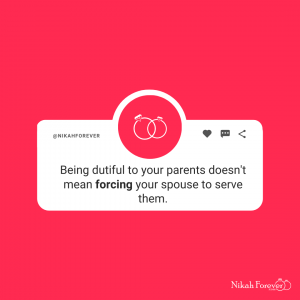
Marriage is the most overwhelming time in our women’s lives, particularly when adjusting with their in-laws. There are certain cultures where women are obliged to live with In-laws, mainly in India, Pakistan, and Bangladesh.
But is it obligatory for a woman to live and serve her in-laws in Islam? The answer is NO! It’s a huge misconception that Islam does not back; rather, it’s a cultural belief.
From the very beginning, Islam has been uplifting women. Islam gave rights to women 1400 years ago, which were considered revolutionary at that time. Despite Islam being the most liberating religion, Muslims fail to give women equal rights and oppress them. Home should be the first area where women should get their rights.
As our beloved prophet, Muhammad, said, ‘Charity begins at home.’
Women in Islam have a right to have an accommodation that befits them; they can demand to live alone with their husbands, demand independence in running their household, and there is no sin upon her. If one cannot afford a house, they must give their wife a place within the house, where she can live in privacy without any interference.
It’s even more challenging for women to live with In-laws if their brother In-law lives with them because he is not a mahram (a person with whom marriage would be considered haram)
The Quran has clarified the mahrams for a woman; brother in law is not a mahram to a woman. Living with a brother In-law can make a situation even worse because it is tough for a woman to wear a hijab all the time; she cannot dress according to how she wants, she cannot beautify herself for her husband.
Our beloved Prophet said: “Beware of entering upon the ladies,” A man from the Ansar said, “Allah’s Apostle! What about Al Hamu, the in-laws of the wife( the brothers of her husband and nephews etc.)? The prophet (SAW) replied,” The in-laws of the wife are death itself. [Sahih al Bukhari 5232]
It means evils and corruption of heart should be expected more from them than other non-mahram, and women should fear them more.
Some Misinterpreted Hadiths regarding Women
Allah’s Apostle(PBUH)said, “Shall I inform you of the biggest of the great sins?” They said, “Yes, O Allah’s Apostle!” He said, “To join partners in worship with Allah and to be undutiful to one’s parents. [Sahih al Bukhari 6273]
Being dutiful to your parents doesn’t mean forcing your spouse to serve them. A son should look after his parents’ needs and do his best to provide them comfort and serve them. Similarly, a daughter should also obey her parents and care for their needs. No one should force a woman to cook, clean and do daily chores to please her in-laws. Men should emotionally and physically refrain from forcing their wives to serve their Parents as Islam does not mandate it.
The Messenger of Allah, peace and blessings be upon him, said, “If a woman prays her five prayers, fasts her month of Ramadan, guards her chastity, and obeys her husband, she will enter Paradise from any gate she wishes. [Musnad Ahmad 1664]
Many Muslim folks misinterpret this hadeeth and use it to oppress their women by forcing them to take care of the house inhabited by their parents. Being a servant to in-laws is oppression, not obedience to the husband.
Our beloved prophet said, “Oppression will be a darkness on the Day of Resurrection.” [Sahih bukhari]
Allah’s Messenger said, “Be afraid, of the curse of the oppressed as there is no screen between his invocation and Allah.” [Sahih Bukhari]
A woman is not a bad daughter-in-law just because she refused to serve her in-laws. Islam provides women with the freedom to live their lives as they desire, as long as they adhere to the teachings of the Quran and Sunnah.
Allah’s Messenger (may peace be upon him) said: “The most wicked among the people in the eye of Allah on the Day of judgement is the man who goes to his wife, and she comes to him, and then he divulges her secret. [Sahih Muslim 1437]
It is not permissible for a husband to tell anything private that happened between him and his wife or disclose his wife’s secrets. In-laws cannot interfere with the private matters of husband and wife.
